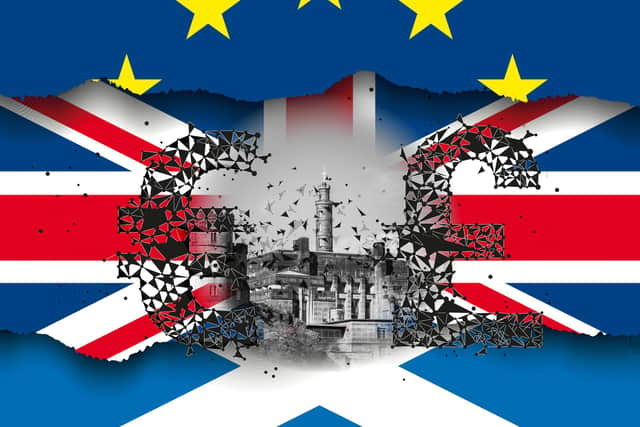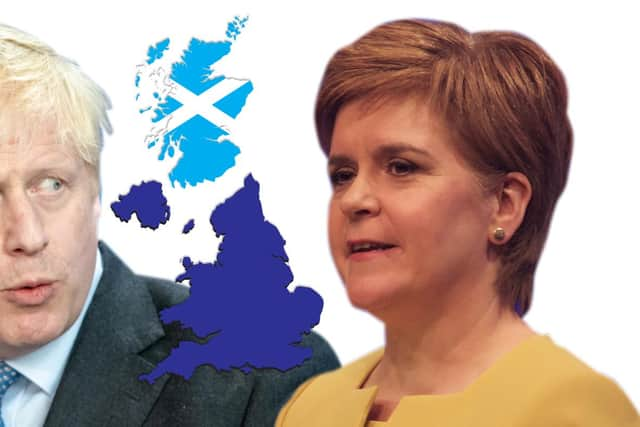What are the arguments against Scottish independence? Experts explain the reasons Scotland would vote ‘No’
and live on Freeview channel 276
All eyes will be watching Scotland for the next few years as the country grapples with deciding its future.
A historic win for the SNP in May’s Holyrood election thrust the issue of independence back into the spotlight, with First Minister Nicola Sturgeon promising voters that a second referendum will be held during the new parliamentary term.
Advertisement
Hide AdAdvertisement
Hide AdWhile support for independence has grown in recent months and the argument for breaking away from the UK has become stronger than it used to be, public opinion on the matter of the country’s future still appears to be equally divided.


So, what are the main arguments against independence?
Here, experts explain why people would vote “No”.
What are the arguments against independence?
The most significant argument against independence is the economic one, professor of politics at Aberdeen University Michael Keating explains.


He says this has been the main case for staying in the UK since the debate began.
“There’s the argument that you’re part of a bigger power, that the UK is a great power in the world, and because of the financial costs of becoming independent there will be less money available for public services,” Prof Keating tells NationalWorld.
Advertisement
Hide AdAdvertisement
Hide Ad“No one denies that an independent Scotland could be viable but there’s the argument about whether it is better off economically as part of a larger unit.”
Prof Keating adds: “People argue that, because of the financial costs of becoming independent, there will be less money available for public services like the NHS.”
James Mitchell professor of public policy at the University of Edinburgh, agrees that the economic argument is the most important for Unionists - that being part of the larger UK economy provides a bigger market for Scottish goods and services.
He says: “They argue that Scotland gains from its share in wealth generated throughout the state - notably, the main generator of wealth is in London and South East England.
Advertisement
Hide AdAdvertisement
Hide Ad“In essence, the sharing resources argument lies at the heart of the case for the union.”
Another common Unionist argument “that has been around for the last 60 years at least”, Prof Keating says, is that Scottish people get more in public spending per head than England.
Leading think tank, the Institute of Fiscal Studies, claimed in a new analysis in March this year that spending in Scotland is 30% higher per person than in England due to the Barnett Formula - the mechanism used by the UK Treasury to calculate changes in the annual funding provided by Westminster to the Scottish Government.
What about the ‘hard border’ with England?
There would no doubt be short-term “disruption and uncertainty” if Scotland were to become independent, according to Prof Mitchell.
Advertisement
Hide AdAdvertisement
Hide AdHe points to the issue of the border with England, which would inevitably become more “significant and meaningful” if Scotland were to separate from the UK.
Currently, that Anglo-Scottish border is frictionless, meaning people and trade can freely move across it.
But a problem arises if an independent Scotland were to join the EU while the rest of the UK remained outside the bloc.
The border with England would then become a border between the EU and a third country, which would lead to customs checks and other regulations being brought in.
Advertisement
Hide AdAdvertisement
Hide AdIn this way, the border has the potential to “create a headache” for independence supporters, Prof Mitchell says, by making trade difficult between Scotland and England.
But while there may be economic costs of a so-called “hard border” for goods and services between the two countries, there would be benefits of being part of the EU single market again, according to Dr Kirsty Hughes, director and founder of the Scottish Centre on European Relations.
She argues: “The border is an economic issue in terms of how it would impact trade between Scotland and England - and we’ve already seen what problems borders can cause.
“But I don’t think you can only talk about the border - you have to look at the overall costs and benefits of independence on the economic side and see how that relates to any costs on the border side.”
Advertisement
Hide AdAdvertisement
Hide AdThese benefits could be the free movement of people between Scotland and the EU, foreign and security policy and businesses taking advantage of that bigger market, she says.
How does currency come into the argument?
Another economic argument against breaking off from the UK is the question of which currency an independent Scotland would use.
Ms Sturgeon has said, if people were to vote in favour of independence, the country would stick to using the pound before switching to its own national currency.
But Prof Mitchell calls the issue of currency “a major problem”.
Advertisement
Hide AdAdvertisement
Hide Ad“Given the relative state of Scotland’s economy and thereby public finances there would at least be a difficult period of adjustment,” he says.
“Much would depend on negotiations between London and Edinburgh, and indeed the EU.”
.
Placing the economic argument aside, for many Unionists, being against independence comes down to the perceived prestige of British values.
Prof Keating notes the common rhetoric is that Scottish nationalism is “narrow and inward-looking” while all the higher values that underpin democracy are part of the Union.
Advertisement
Hide AdAdvertisement
Hide AdHe says: “There’s the argument that you’re part of a bigger power, that the UK is a great power in the world.”
“The alternative nationalist argument is that the nation is Britain, not Scotland, and the integrity of the British nation-state should be protected,” Prof Mitchell echoes.
What questions still need to be answered on the ‘No’ side?
The academics agree that there is still a lot of work to be done by both sides if another referendum were to take place.
Sixty years ago, the argument seemed to be on the side of the Unionists, Prof Keating says, but now you can make a plausible argument on either side.
Advertisement
Hide AdAdvertisement
Hide AdAccording to him, this time around the Unionists need to answer the all-important question: “Why the Union?”
“In the past, it was always the nationalists who were forced to justify why they wanted to become independent, but now the Unionists need to answer the question of, ‘Why not?’
“They need to answer what kind of UK is there going to be, how do they reconcile Brexit with keeping the Union together and what does the Union really need?
“For the first time, they’re forced to come up with positive arguments for the Union instead of falling back on this ‘Britishness’ argument.”
Advertisement
Hide AdAdvertisement
Hide AdAnd it’s significant to point out that, during the 2014 referendum, the Unionist side persuaded people to vote ‘No’ in order to stay in the EU - the “opposite of which turned out to be true”, Prof Keating says.
Yet, ultimately, a fresh independence vote could come down to whether or not the electorate still feels uncertain.
“The big factor last time was pure uncertainty as to what would happen, and people who are naturally risk-averse tended to vote ‘No’,” Prof Keating explains.
“All the Unionists had to do then was create doubt as a lot of people were held back by the fear of the unknown.
“But that may be changing now because you have a greater number of people who are more determinedly pro-independence.”
